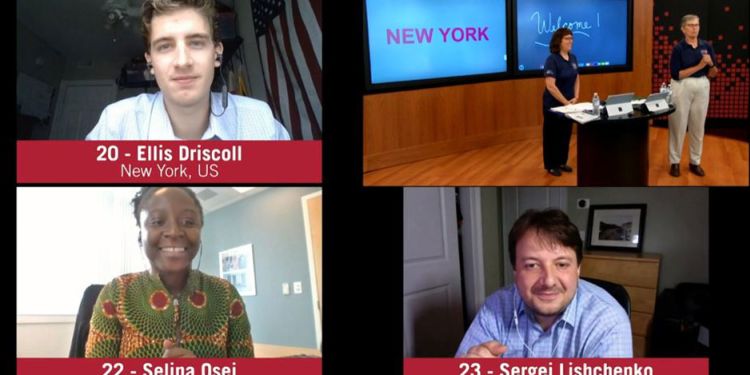The Greater Boston Food Bank enlisted the help of Harvard Business School Online and its global community of more than 50,000 learners to address food insecurity through an “End Hunger” Challenge. The Challenge called for teams to develop innovative, cost-effective, scalable ways for pantries to deliver nutritious food to clients and ideas that could help end hunger in their own communities.
“Getting food to the people who need it is really hard and expensive,” said Carol Tienken, GBFB chief operating officer. “This Challenge gave us the opportunity to tap some great business minds to offer creative ideas to help us tackle this insidious problem.”
Ten teams submitted proposals and five finalists—from Boston, Los Angeles, New York, Oslo, Norway, and Sao Paulo, Brazil—recently presented their ideas via the HBS Live Online Classroom. The GBFB executives Carol Tienken and Cheryl Schondek debated and discussed the proposals in real time with the finalists and then chose the New York City team as the competition winner.
"Helping the GBFB in its efforts to end hunger, specifically in Greater Boston by 2028, was a truly exciting, unique, and humbling experience,” said Selina Osei, a member of the HBS Online New York winning Chapter. “We took a human-centered approach and drew from our personal and professional backgrounds to target specific pain points. After researching the issue, we proposed a comprehensive, strategic plan that will allow the GBFB to maximize operational efficiency of the existing supply chain and implement new technologies in the future. I think what made the difference was that we laid out how all the various elements could be effectively implemented over the short- and long-term."
The New York City proposal featured the development of a mobile app to help with warehouse inventory management, volunteer scheduling and incentives, cooperation of neighboring pantries, and client outreach. The proposal also recommended utilizing mobile markets, centrally located stationary lockers, and robots and autonomous vehicles to enable safe food distribution. The New York team included Junaid Mian, Sergei Lishchenko, Vishal Mummigatti, Ellis Driscoll, Judy Crane, and Selina Osei.
“All of the submissions were outstanding, but we chose New York because they had the most cost-effective, innovative, and scalable ideas,” said Cheryl Schondek, GBFB senior vice president of food acquisition and supply chain. “It was clear they did extensive research and understood our structure and the complexity of the problem. Their proposal offered creative ways to build on our existing processes and kept in mind the critical objective of respecting the dignity of the client.”
“We were thrilled to partner with the GBFB and engage our Community in developing creative ideas to address this universal challenge,” said Simeen Mohsen, managing director at Harvard Business School Online. “We are proud of the innovative ideas our Community generated.”
The GBFB is on a mission to make Eastern Massachusetts hunger-free by 2028 and expects to implement a number of ideas that were surfaced through the Challenge to help meet that goal. They also anticipate sharing the concepts with food banks across the country and throughout the world.
Are you interested in learning more about upcoming Community Challenges or want to plug into other networking opportunities? Join our Community to find events near you.


